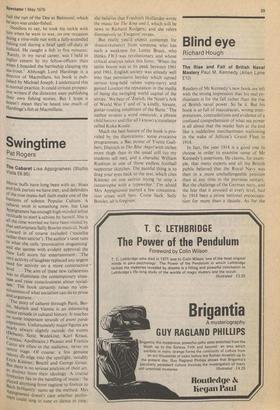Blind eye
Richard Hough
The Rise and Fall of British Naval Mastery Paul M. Kennedy (Allen Lane £10) Readers of Mr Kennedy's new book are left with the strong impression that his real enthusiasm is for the fall rather than the rise of British naval power. So be it. But his book is so full of inaccuracies, wrong interpretations, contradictions and evidence of a confused comprehension of what sea power is all about that the reader feels at the end like a rudderless merchantman wallowing in the wake of Jellicoe's Grand Fleet in 1914.
In fact, the year 1914 is a good one to choose in order to examine some of Mr Kennedy's assertions. He claims, for example, that many experts and all the British public believed that the Royal Navy was then in a more unchallengeable position than at any time in the previous century. But the challenge of the German navy, and the fear that it aroused at every level, had by 1914 been a prime national preoccupation for more than a decade. As for the experts, Jellicoe himself was haunted by the fear not just of the German challenge but of German parity with the Grand Fleet, and would not have agreed with the author (who could?) that the odds against the Germans 'were overwhelming'.
Mr Kennedy says that British shipbuilding, too, was not challenged in 1914, when in fact we were losing contracts for Dreadnoughts to German and American yards. Sea power itself, this book claims, was declining in relation to land power. Then we read details of the greatest naval power race the world has known, and the astonishing statement that the German High Seas Fleet in 1914 was 'not anti-British in origin'. Still in 1914, we are told that the admirals of the Royal Navy, presumably including Hood, Arbuthnot and other firebrands, 'admitted that the primacy of combating German aggression was in the army's hands'. The performance of the Royal Navy in the First World War was seen by the public as 'inglorious and subsidiary', Mr Kennedy tells us. But what of the public's relief and joy at the surrender of the German fleet, and the national idolising of David Beatty? On one page we are told that the claims of the Admiralty about the effectiveness of a blockade of Germany were exaggerated, then that the results of the blockade were subsidiary, and finally that 'in the long term the consequences of the Allied blockade were very serious'.
In a chapter on the Second World War, significantly entitled 'The Illusory Victory', the author writes of 'the decline. in the importance of the naval blockade and of sea power itself'. Tell that to Admirals Nimitz, Cunningham and Raeder, to Field Marshal von Rundstedt in Normandy in 1944 and to German housewives in 1945! In Mr Kennedy's words, the admirable Treasury was 'cursed by the re-armers' in the years leading to the Second World War. Having misguidedly re-armed and declared war, Britain 'the sagging partner' then dragged in the USA. It was all, it seems, a dreadful blunder. We should not have fought so, hard—'or even fought at all'.
A naval historian should have an understanding of human beings, and of sailors in particular. From Howard of Effingham to Bruce Fraser, the author shows no comprehension of the nature of the sailor or his achievements. He has not only put the historical telescope to his blind eye but has got it round the wrong way. If we cannot have pride in British maritime history and in the men who created it, at least some basic knowledge of sailors and the sea is essential to a history which 'represents to carry out the first detailed consideration of the history of British sea power since Mahan'.



































 Previous page
Previous page